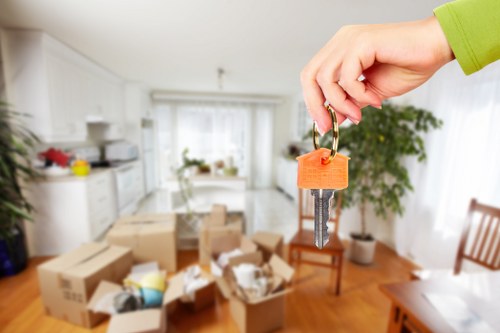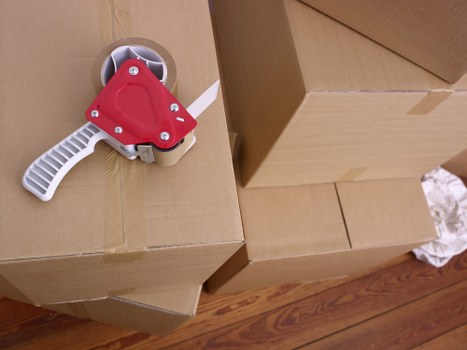Comprehensive Guide to Council Rubbish Collection in Garston

Managing household waste is a crucial part of maintaining a clean and healthy environment in any community. In Garston, residents rely on the council rubbish collection services to ensure that waste is disposed of efficiently and responsibly. This article delves into the various aspects of the council rubbish collection in Garston, providing residents with all the necessary information to keep their surroundings clean.
Understanding the council rubbish collection schedule is essential for residents to comply with local regulations and avoid potential fines. The council provides a structured timetable, ensuring that waste is collected regularly and that recycling efforts are maximized.
In addition to regular waste collection, the council also offers special collection services for bulky items and hazardous waste. Knowing how to access these services can make the process of disposing of larger or dangerous items safer and more convenient.
Rubbish Collection Schedule in Garston

The council rubbish collection in Garston follows a specific schedule designed to keep the area clean and organized. Typically, waste collection occurs once a week, with designated days for different types of waste. It is important for residents to adhere to the schedule to ensure timely and efficient collection.
Weekly Collection: General household waste is collected weekly, ensuring that bins do not overflow and that the neighborhood remains tidy. Residents are advised to place their bins out the night before the collection day.
Recycling Program: Garston encourages recycling by providing separate bins for recyclable materials such as paper, glass, and plastics. The recycling collection usually happens on a different day from the general waste collection, promoting better sorting and processing of recyclable items.
How to Prepare for Rubbish Collection

Proper preparation for rubbish collection can enhance the efficiency of the process. Here are some key steps residents should follow:
- Ensure that all waste is securely bagged to prevent spillage.
- Separate recyclable materials from general waste.
- Place bins in the designated collection area by 7 AM on the day of collection.
- Check the council’s website or local notices for any changes in the schedule.
By following these guidelines, residents contribute to a cleaner community and facilitate the smooth operation of the council rubbish collection services.
Additionally, during peak seasons or public holidays, the collection schedule might be adjusted. It is advisable to stay informed through official channels to avoid any inconveniences.
Special Waste Collection Services

Beyond regular rubbish collection, the Garston council offers special services to handle items that require careful disposal. These services are essential for maintaining public health and environmental standards.
Bulky Waste Collection: Large items such as furniture, appliances, and electronics that do not fit into regular bins can be scheduled for a bulky waste collection. Residents need to book an appointment in advance and ensure that items are accessible for pick-up.
Hazardous Waste Disposal: Items like batteries, paint, and chemicals pose significant risks if not disposed of properly. The council provides specific guidelines and collection points for hazardous waste to prevent environmental contamination.
Recycling Initiatives in Garston

The Garston council is committed to promoting recycling and reducing the amount of waste sent to landfills. Through various initiatives, the council encourages residents to participate actively in recycling efforts.
- Recycling Education: Informative campaigns and workshops educate residents about the importance of recycling and how to sort waste correctly.
- Recycling Centers: Accessible centers are available for residents to drop off recyclable materials, ensuring that items are processed efficiently.
- Incentive Programs: Rewards and incentives are offered to households that consistently adhere to recycling guidelines, fostering a culture of sustainability.
These initiatives not only help in conserving natural resources but also contribute to reducing the carbon footprint of the community.
Moreover, the council continuously explores new methods and technologies to enhance recycling processes, aiming to achieve higher efficiency and better environmental outcomes.
Local Impact of Council Rubbish Collection

Effective rubbish collection has a significant impact on the local community in Garston. It ensures that public spaces remain clean, reduces health hazards, and contributes to the overall well-being of residents.
Environmental Benefits: Proper waste management reduces pollution, conserves resources, and minimizes the environmental footprint of the community. Recycling and responsible disposal practices play a key role in these benefits.
Public Health: Efficient rubbish collection prevents the accumulation of waste, which can attract pests and become breeding grounds for diseases. Clean neighborhoods promote better health standards for all residents.
Challenges in Rubbish Collection

Despite the efforts of the Garston council, there are challenges associated with rubbish collection that need to be addressed to maintain service quality.
- Increased Waste Generation: As the population grows, so does the amount of waste, putting pressure on existing collection systems.
- Recycling Compliance: Ensuring that all residents adhere to recycling guidelines can be difficult, leading to contamination of recyclable materials.
- Resource Allocation: Balancing budget constraints with the need for efficient services requires careful planning and resource management.
Addressing these challenges involves continuous improvement of waste management strategies, community engagement, and investment in better infrastructure.
Community participation is crucial in overcoming these obstacles, as collective efforts can lead to more sustainable waste management practices.
10-15 Nearby Areas to Garston and Their Rubbish Collection

Garston is surrounded by several nearby areas, each with its own unique features and rubbish collection services tailored to their specific needs. Understanding how these areas manage their waste can provide insights into best practices and shared challenges.
- Speke: Just west of Garston, Speke benefits from similar collection schedules, with additional recycling points available at local supermarkets.
- Otley: North of Garston, Otley has a robust bulky waste collection service, particularly catering to the suburban population.
- Church Road: Known for its residential neighborhoods, Church Road offers frequent recycling pickups to accommodate high-density living.
- Bloomer Way: This area emphasizes community clean-up initiatives alongside regular rubbish collection to maintain green spaces.
- Aigburth: Combining urban and residential zones, Aigburth has specialized waste collection for commercial establishments.
- Herries Lane: With several schools and parks, Herries Lane focuses on educational programs about waste reduction and recycling.
- Old Swan: Catering to both old and new developments, Old Swan incorporates modern waste management technologies.
- Lyndhurst: This area has implemented waste-to-energy programs, converting non-recyclable waste into usable energy.
- Woolton: Woolton emphasizes green living, offering numerous recycling centers and composting facilities.
- Formby: Known for its coastal location, Formby has specialized waste collection to handle beach-related litter and marine waste.
- Marleston: Marleston provides tailored services for both residential and industrial waste, ensuring comprehensive coverage.
- Berryfield: With its diverse population, Berryfield focuses on multicultural education about waste management.
- Westgate: Westgate incorporates smart waste bin technologies to monitor and optimize collection routes.
- Palace Road: Central to Garston, Palace Road integrates commercial waste with residential collection for efficiency.
- Ancient Wood: With extensive green areas, Ancient Wood emphasizes organic waste collection for composting.
How to Report Missed or Problematic Rubbish Collection

Occasionally, residents may experience missed rubbish collections or encounter issues such as overflowing bins. Knowing how to report these problems ensures that they are addressed promptly.
Online Reporting: The Garston council provides an online portal where residents can log complaints or report missed collections. This system allows for efficient tracking and resolution of issues.
Phone Support: For urgent matters, residents can contact the council’s waste management hotline. Speaking directly with a representative can expedite the resolution process.
Contacting the Council

Effective communication with the council is key to resolving rubbish collection issues. Residents are encouraged to provide detailed information when reporting problems to ensure accurate and swift action.
- Provide the exact location and nature of the problem.
- Include photos if possible, to give a clear understanding of the issue.
- Follow up if the problem is not resolved within the expected timeframe.
Maintaining a good relationship with the council benefits the entire community, promoting a cleaner and healthier living environment.
Additionally, feedback from residents helps the council improve its services, making rubbish collection more efficient and responsive to community needs.
Tips for Reducing Household Waste

Minimizing the amount of waste produced is a significant step towards sustainable living. Here are some practical tips for reducing household waste in Garston:
- Reuse Items: Before discarding items, consider if they can be reused or repurposed for other functions.
- Composting: Organic waste can be composted to create nutrient-rich soil for gardens, reducing the need for landfill disposal.
- Buy in Bulk: Purchasing items in bulk minimizes packaging waste and reduces the frequency of purchases.
- Choose Recyclable Products: Opt for products made from recyclable materials to ensure they can be processed effectively.
- Proper Sorting: Ensure that waste is sorted correctly into general, recyclable, and hazardous categories to streamline the collection process.
Implementing these habits not only reduces waste but also fosters a culture of sustainability within the community.
Moreover, educating family members about the importance of waste reduction can amplify these efforts, creating a collective impact on the environment.
Community Involvement in Waste Management

Community involvement is vital in enhancing the effectiveness of council rubbish collection services. When residents actively participate, the overall waste management system becomes more efficient and sustainable.
- Neighborhood Clean-Up Events: Organizing regular clean-up drives helps maintain public spaces and fosters a sense of community.
- Waste Reduction Workshops: Educational sessions on waste management empower residents with the knowledge to make informed decisions about their waste.
- Volunteer Programs: Volunteers can assist in various aspects of waste management, from sorting recyclables to educating peers.
These initiatives not only improve the cleanliness of Garston but also strengthen bonds among residents, creating a more cohesive and proactive community.
Additionally, community-driven solutions can address specific waste management challenges unique to different areas, ensuring tailored and effective outcomes.
Technological Advancements in Rubbish Collection

Advancements in technology have revolutionized the way rubbish collection is managed. The Garston council leverages modern solutions to improve efficiency and service quality.
Smart Bins: Equipped with sensors, smart bins can monitor waste levels in real-time, optimizing collection routes and schedules to prevent overflows.
Automated Sorting: Technology-driven sorting systems enhance the accuracy and speed of recycling processes, ensuring that more materials are recycled properly.
Environmental Monitoring

Environmental monitoring tools help the council assess the effectiveness of waste management practices and identify areas for improvement. Data collected from these tools inform policy decisions and strategic planning.
- Waste Tracking Systems: These systems track the volume and types of waste generated, providing valuable insights into waste trends.
- Emission Controls: Monitoring emissions from waste collection vehicles ensures compliance with environmental regulations.
- Resource Management: Efficient use of resources, such as fuel and manpower, is achieved through careful monitoring and optimization.
Implementing these technologies not only enhances operational efficiency but also underscores the council’s commitment to environmental stewardship.
Continuous investment in technology ensures that Garston remains at the forefront of innovative waste management practices.
Future Plans for Rubbish Collection in Garston

The Garston council is always looking ahead to improve rubbish collection services. Future plans focus on sustainability, efficiency, and community engagement.
Expansion of Recycling Programs: Plans are underway to introduce more comprehensive recycling programs, including the collection of electronic waste and textiles.
Enhanced Public Education: Increasing efforts to educate residents about waste reduction and recycling will be prioritized, aiming to boost participation rates.
Innovative Waste Management Strategies

To stay ahead of waste management challenges, the Garston council is exploring innovative strategies that align with global sustainability goals.
- Waste-to-Energy Plants: Converting non-recyclable waste into energy can provide sustainable power sources while reducing landfill use.
- Biodegradable Packaging: Encouraging the use of biodegradable materials in packaging can significantly decrease plastic waste.
- Community Composting: Establishing local composting sites empowers residents to turn organic waste into valuable compost for gardens.
These forward-thinking initiatives demonstrate the council’s dedication to fostering a sustainable and environmentally responsible community.
By embracing innovation, Garston aims to set a benchmark for other communities in effective and sustainable waste management.
Conclusion

Council rubbish collection in Garston plays a pivotal role in maintaining a clean, healthy, and sustainable community. From regular waste pickups to specialized services for bulky and hazardous waste, the council ensures that waste management meets the needs of all residents.
Through ongoing initiatives, technological advancements, and community involvement, Garston continues to enhance its rubbish collection services. Residents are encouraged to stay informed, participate actively, and adopt sustainable practices to contribute to the collective well-being of the community.
By understanding and utilizing the available services, residents can make a significant impact on the environment and the overall quality of life in Garston.
Frequently Asked Questions

1. How do I book a bulky waste collection in Garston?
You can book a bulky waste collection by visiting the Garston council's official website and filling out the bulky waste request form. Alternatively, you can call the council’s waste management hotline to schedule a pickup.
2. What items are considered hazardous waste?
Hazardous waste includes items like batteries, paint, chemicals, fluorescent bulbs, and electronic devices. These items require special handling and should not be disposed of in regular rubbish bins.
3. Can I recycle glass bottles on the same day as general waste collection?
Yes, recycling glass bottles is typically scheduled on a different day from general waste collection. Check the council’s recycling schedule to ensure proper disposal.
4. What should I do if my rubbish bin is not collected?
If your rubbish bin is not collected on the scheduled day, report the issue through the council’s online portal or contact their waste management hotline for assistance.
5. Are there any fees for special waste collection services?
Some special waste collection services may incur a fee, depending on the type and volume of waste. It is best to check the council’s website or contact them directly for specific fee information.